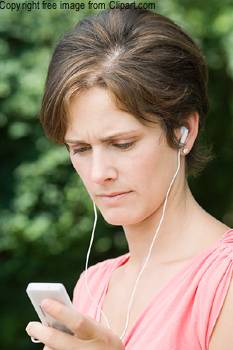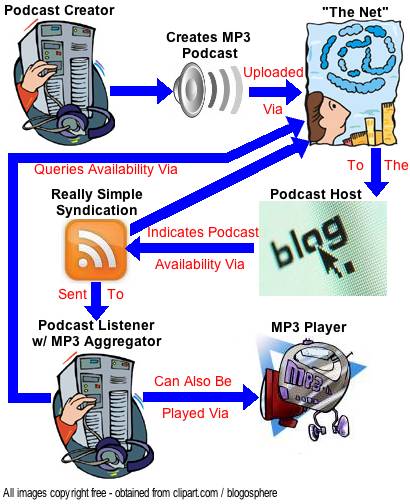Radio Restated: Podcasting in Education – Major Project
By Stephanie Hopkins & Michael Haworth
 Many years have passed since the dawn of the “golden age of radio”, and the birth of educational radio in North America. Educational radio programming in Canada and the United States brought forth new pedagogical methodology while supporting text-based education. Named “the new transistor radio” by Jon Udell, (Campbell, 2005, p. 38), and “the next generation of radio” by Steven Jobs (as cited in Baker, Harrison & Yates, 2007, p.31), podcasting now brings to the digital age what educational radio could not: portability, convenience, and choice. While “audio has traditionally been neglected and underused as a teaching and learning medium” (Chan, Lee & McLoughlin, 2006, p. 111), this is beginning to change as educational institutions focus on the perceived opportunities and benefits that podcasting offers. In both K-12 and post-secondary sectors, podcasting is making an positive impact in literacy, the sciences, language arts, second language education and more. Institutions are beginning to recognize the benefits of podcasting, and universities such as Purdue, Duke, and Georgia College & State University are now involving students in podcasting. George Siemens (2004) argues that technology shapes learning. It is clear that the potential for learning through podcasting in all levels of education is great; “[i]t’s enormously motivating to watch learners learn through dialogue – forming connections with learners and experts beyond the walls of a classroom” (Siemens, 2009, para. 9).
Many years have passed since the dawn of the “golden age of radio”, and the birth of educational radio in North America. Educational radio programming in Canada and the United States brought forth new pedagogical methodology while supporting text-based education. Named “the new transistor radio” by Jon Udell, (Campbell, 2005, p. 38), and “the next generation of radio” by Steven Jobs (as cited in Baker, Harrison & Yates, 2007, p.31), podcasting now brings to the digital age what educational radio could not: portability, convenience, and choice. While “audio has traditionally been neglected and underused as a teaching and learning medium” (Chan, Lee & McLoughlin, 2006, p. 111), this is beginning to change as educational institutions focus on the perceived opportunities and benefits that podcasting offers. In both K-12 and post-secondary sectors, podcasting is making an positive impact in literacy, the sciences, language arts, second language education and more. Institutions are beginning to recognize the benefits of podcasting, and universities such as Purdue, Duke, and Georgia College & State University are now involving students in podcasting. George Siemens (2004) argues that technology shapes learning. It is clear that the potential for learning through podcasting in all levels of education is great; “[i]t’s enormously motivating to watch learners learn through dialogue – forming connections with learners and experts beyond the walls of a classroom” (Siemens, 2009, para. 9).
References cited in main paper.
 Radio Restated: Podcasting in Education Main Paper
Radio Restated: Podcasting in Education Main Paper
To view a PDF copy of our main paper use this link.
 Radio Restated: Podcasting in Education Supplementary Podcast
Radio Restated: Podcasting in Education Supplementary Podcast
Length 5:44
Please Note: May take a few moments to fully cache podcast.
Download link for podcast mp3 file if player is not present above.
 Radio Restated: Podcasting in Education Podcast Creation and Distribution Diagram
Radio Restated: Podcasting in Education Podcast Creation and Distribution Diagram
 Radio Restated: Podcasting in Education Delicious Links
Radio Restated: Podcasting in Education Delicious Links
In addition, we have also created delicious page to share our some of our resources with you. Please feel free to view or add any of the links at http://delicious.com/fvdeshoo/podcasting![]()



6 comments
1 Erin Gillespie { 11.27.09 at 3:45 am }
Excellent. I love how you put the podcasting tips directly to practice in your own cast. Thank you for not restating what you presented so well in your paper! Also, your paper is detailed, with convincing evidence to support your arguments and I’ve saved it for the rich resources and as a resource itself. You state in your cast that you hope your research inspires others to use podcasting and you’ve definitely inspired me! Erin
2 Michael Haworth { 11.27.09 at 8:28 am }
Hi Erin, thanks for the vote of confidence in our work – we are glad that you enjoyed it. It was a lot of fun to develop the paper and the podcast. Podcasting has so many neat capabilities that should be investigated. Perhaps a revival of the oral/aural tradition is upon us? Michael
3 Diddly { 11.30.09 at 8:58 pm }
Hi Stephanie and Michael, thanks for explaining podcasts, I have really wanted to know how to make them. You have created a great resource. I especially like the way you have used the visual, aural and textual in a way that complements while avoiding repetition. I was stimulated and educated.
Dilip
4 Michael Haworth { 12.01.09 at 9:48 am }
Hi There – glad that our project was able to help clarify podcasting for you. Podcasting is an interesting revival of oral / aural tradition using 21st century technologies and is being used in many different ways to support education. All the best with your ventures with podcasting – it is great fun! Michael
5 Natalie Giesbrecht { 12.02.09 at 7:22 pm }
Hi Stephanie and Michael,
What a professional sounding podcast! You did a great job. I liked how you made used of several different ways to present information. What I have found is that podcasts – as they can be quick and easy to produce – have implications for accessibility. Many instructors do not use a scripts so transcripts need to be produced after the fact. Now if there was a free and easy to use software that would record and produce a transcript – that would be fabulous!
Best,
Natalie
6 Michael Haworth { 12.05.09 at 12:06 pm }
Hi Natalie, we greatly appreciate your thoughtful comments. After your comment about the transcript, I wondered if we should have included that as well for another alternative method of accessing the podcast. It amazes me how text keeps coming back into the picture even with an orally based product such as a podcast. The software that we used with this podcast (Audacity and GarageBand) really helped with the development of the final product – we were quite pleased with the final product – glad that you enjoyed it too! Cheers, Michael
You must log in to post a comment.